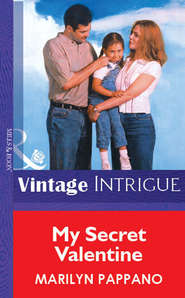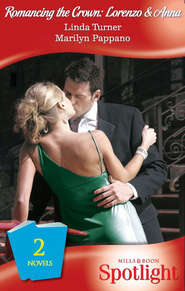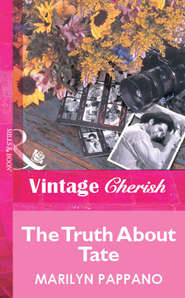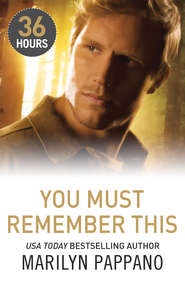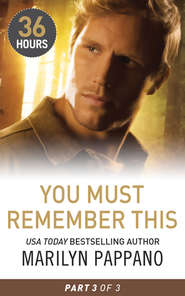По всем вопросам обращайтесь на: info@litportal.ru
(©) 2003-2025.
✖
One True Thing
Автор
Год написания книги
2018
Настройки чтения
Размер шрифта
Высота строк
Поля
“Yes.”
“What about your house?”
There was a reason she didn’t encourage casual conversation when she found herself with neighbors, she thought with a tautly controlled breath. Too many questions, too many chances for missteps. Not that the consequences were likely to be deadly, but she never knew.
“I gave up my apartment and put everything in storage,” she replied, deliberately injecting a distant tone into her voice. “Finding a new place to live is easy.” She’d done it more times in the past few years than any sane person should have to endure.
She stood, slid her feet into her thongs, then carried the book and her glass to the deck. Returning, she shook out the sheet and started to haphazardly fold it. “I’ve got to get back to work.”
Jace showed no intention of leaving. Instead he leaned back, his arms supporting him, and stretched his legs out. “Writing must be hard work.”
“More for some than others.”
“How long have you been doing it?”
“A while.”
“Have you sold anything?”
“A few books.” After all, a writer who could travel fifteen hundred miles to write a book in a rented lakefront cabin had to have some source of income, right? And it had to be a source that didn’t require eight-to-five workdays in an office somewhere, and to pay well enough to justify the expense of a temporary cross-country move.
“How many is that?”
She shrugged.
“Fewer than five? More than ten?”
With a roll of her eyes, she pretended to count mentally, then said, “Seven.” It was everyone’s lucky number, and though her life had been utterly devoid of luck the past couple of years, she could pretend like everyone else, couldn’t she?
“Seven. Lucky number.”
She smiled thinly. “Seventy will be luckier…but if I don’t get to work, I won’t even see eight.”
She intended to march into the house then, but he finally moved to get up and she couldn’t resist watching. His legs were long and muscular—runner’s legs, though she couldn’t imagine him summoning up enough energy to jog from her house to his—and he moved with the grace and ease she’d sorely needed for ballet class when she was seven. Instead she’d been the clumsiest student Miss Karla had ever taught and, after falling off the stage during a recital, she had gladly hung up her slippers.
When he was on his feet, he stretched and his T-shirt rode up to display a thin line of smooth brown skin above the narrow waist of his cutoffs. Her fingers tingled to see if it was as warm and soft as it looked. She knotted them into a fist under the cover of the sheet.
“The invitation for lasagna still stands,” he remarked.
“No, thanks. I’m not hungry.” Her stomach chose that moment to remind her that breakfast had been skimpy and a long time ago.
He grinned. “Are you sure about that? Mom makes it all from scratch—the noodles, the sauce and the garlic bread on the side—and it’s even better the second day.”
She hadn’t had lasagna in ages. She didn’t like the frozen stuff, and cooking for just herself was an unnecessary reminder of how alone she was. Granted, a ham sandwich would fill her stomach just as well and had the added benefit of no conversation to stumble through. But she’d had a ham sandwich for lunch the day before, and for supper last night, and would have one for supper tonight. Besides, she could control the conversation. She’d been doing it long enough, giving out only what information she wanted to give, manipulating it to go in the directions she wanted. She’d just gotten clumsy this morning because he’d literally caught her sleeping.
He was rocking back on his heels, waiting for an answer. She eyed him warily. “What’s for dessert?”
“Strawberry pie with whipped cream.”
Cassidy stifled a groan. She loved strawberries. When she was a kid, every Saturday in strawberry season, the family had driven to a pick-your-own berry farm and filled quart containers by the dozen. They had always managed to eat at least three quarts on the way home, where she’d helped her mother make strawberry shortcake, pie and preserves.
“I suppose it can’t hurt this once,” she said reluctantly. It wasn’t smart, but it wouldn’t be the dumbest thing she’d ever done, either. Sure, he was a stranger, but he was a local. He had family here. He didn’t know her from Adam. He had some doubts about her stories, but so what? He was a cowboy when he worked at all. What did it matter whether he believed her? Who was he going to tell? The horses and cows?
Or his cousin, the sheriff? the little voice whispered.
So what? she stubbornly repeated. There was no law against lying…well, unless you were doing it under oath. Or profiting from it. Or doing it to stay out of jail. But what she was doing—lying to strangers about things she had a right to keep private…it might not be ethical, but it wasn’t illegal.
“I’ll put the lasagna in the oven. Dump your stuff inside, then come on over,” Jace said.
She watched until he stepped onto the bridge, then went inside with a sigh. The sheet went on a shelf in the tiny linen closet, the glass and the boom box on the kitchen counter. She shut off the computer, then went to the bathroom to wash up. The face reflected back at her in the mirror was pale with pink spots on the cheeks—and the flush came from a source much closer than the sun. Her hair looked as if she’d forgotten to comb it in recent memory, and her eyes…
She’d read an article on age-progression computer programs that said the one single feature that never changed, no matter a person’s age, was the eyes. You could change the color with contact lenses—she’d done that a time or two—and enhance them with makeup, but the basic shape stayed the same. Hers seemed terribly different to her, but of course it wasn’t the shape. It was the shadows. The wariness. The distrust. The fear. Did Jace the Cowboy recognize any of that, or did he, like most people, simply see a pair of unremarkable brown eyes?
Truthfully, she didn’t want to know. If he was perceptive, she would have to keep her distance from him—which she intended to do anyway, of course. But doing it by choice was better than doing it because she had to.
She changed into clothes that weren’t damp from sunning—tailored and cuffed shorts in khaki, a cotton shirt in olive drab, sand-colored sandals. The shirt was tucked in, the shorts belted with a matching olive belt. She combed her hair, added a touch of makeup, then frowned at herself. Would he think she’d dressed up for him? Maybe she should switch to denim shorts and a tank top, or jeans and a T-shirt. Maybe…
Still scowling, she shut off the light and left the bathroom. She stopped at the dresser long enough to slide a few things into her pocket—a tube of lip gloss, her keys and a small round canister—then she headed for the door.
The lasagna and bread were heating in the oven, the pie chilling in the refrigerator. The windows and door were open and a box fan set in the lakeside window blew cool air through the room.
Jace leaned against the kitchen counter, sucking down his third bottle of water for the day. He was that rarity among cops, as well as Barnetts—a man who didn’t drink. He’d run too many miles to stay in shape, had worked too many years at a job where the concept of being off duty was a joke. Trouble could find a cop at any time, and he’d wanted his senses unimpaired when it happened.
He glanced at the clock while waiting for Cassidy to put in an appearance. He’d been home ten minutes—more than long enough for her to carry a few things inside, then walk across the bridge. He wouldn’t be surprised if she’d locked herself inside instead. She’d obviously had misgivings about coming over.
She obviously had something to hide.
Okay, maybe not so obviously. Maybe, even after six months off the job, his instincts were as sharp as ever. He was used to people being less than honest with him. It gave him an itchy feeling down his spine and he’d been wanting to scratch the whole time they’d been talking. He couldn’t say she’d flat-out lied to him, but she’d certainly been evasive, and wondering why came as naturally to him as breathing.
But it wasn’t his job to find out. In fact, his only job was to do a lot of nothing. To kick back, relax and stay out of trouble. He was free to take advantage of whatever entertainment he could find along the way, but that was the extent of it. No poking around in anyone’s background. No ferreting out inconsistencies or solving mysteries. No getting involved in anyone’s troubles but his own.
A board in the middle of the deck creaked and he shifted his gaze to the screen door. An instant later Cassidy appeared there, looking lovely and unsure, as if she might bolt back home at anytime.
“Come on in,” he called as she raised her hand to knock.
She stepped inside, smiled faintly in greeting, then glanced around. The layout of the cabin was identical to hers—living and dining room stretched across the front, kitchen in back on the left, bedroom and bathroom on the right. He hadn’t been inside Junior’s place in years, but knowing the Davisons, he would bet the same ratty old furniture was still in residence.
That was the only way his cabin was better than hers. He’d brought some of his own stuff—a leather couch, an oversize armchair, a couple of bookcases—and borrowed the bedroom furniture and dinette from his parents. The table was an oval oak pedestal, with four ladder-back chairs, and the bedroom set was his grandmother’s antique mahogany.
He’d added rugs, too, and a television, DVD and stereo system, but he hadn’t unpacked a single thing for the walls. Photographs, a couple of meritorious commendations he’d received, gifts, mementos…anything that would personalize the space and reveal anything about the past seventeen years was packed up in his folks’ attic. It could all stay there until it rotted.
What would her space reveal about her past? Someday he would have to wangle an invitation into her cabin to find out.
“Lunch will be ready in a few minutes,” he said as her gaze finally reached him. “What would you like to drink?”
“Water will be fine.”
“That’s all? I’ve got beer and pop, too.”






